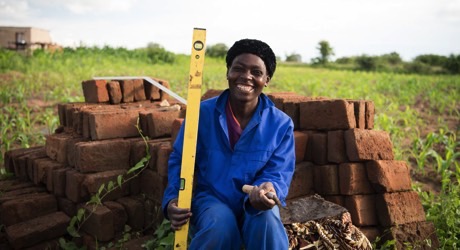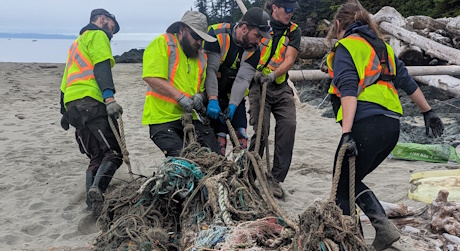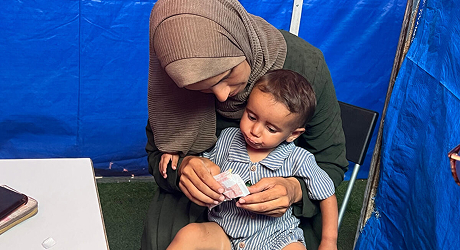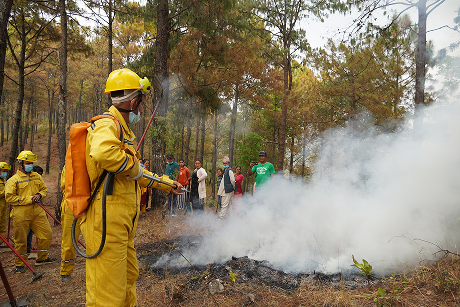Footprints Project
Since 2005, travelers like you have helped us change the world through micro-donations.

-
A total of
7296
Travelers
-
donated
$25002.62
(100% funded) -
to help improve
Water & Sanitation
-
impacting
80000
people -
in
Zimbabwe
Project background
In Zimbabwe, over half the people in rural areas don’t have access to clean water or toilets.
Persistent drought and dilapidated water sources have left communities in dire need, forcing families to collect dirty or contaminated water just to survive. The lack of toilets and adequate sanitation impacts on children’s ability to attend school and parents being able to work and earn an income.
Since the project started in 2017, CARE has rehabilitated boreholes to provide communities with clean and safe water, trained locals to protect and maintain them, as well as continues to promote hygiene education in schools. As women are the ones who are most affected by water scarcity, work is being done to ensure women remain front and centre in community leadership and decision making positions.
During this next phase of Zimbabwe’s WASH project there is a continued focus on ensuring women and girl’s needs are specifically addressed as well as people with disabilities, by constructing girl-friendly and wheelchair-accessible toilets. CARE is also strengthening community involvement by training locals to protect and repair their water sources, so expertise remains in the community long after CARE leaves.
Together, we’re helping to provide sustainable solutions to Zimbabwe’s water crisis, saving lives and helping to break the cycle of poverty.
Project activities
Around the world, one in nine people do not have clean and safe water and one in three still have no toilet. CARE’s Water, Sanitation and Hygiene Project (WASH) is working in the drought prone region of Chivi-South, Zimbabwe, where communities are desperate for safe, clean drinking water.
On top of that, poor sanitation and the occurrence of natural disasters like cyclone ‘Idai’ which caused devastation in Zimbabwe earlier this year, means an increased risk of water-borne diseases like Cholera, with outbreaks particularly common among young children.

When water is scarce, women and girls bear the heavy burden of collecting water for their families. This impacts on their ability to earn an income, and girls often miss school or drop out early when schools don’t have adequate toilet facilities. CARE’s WASH project seeks to ensure women and girls stay engaged in school and decision making processes by promoting leadership and providing better access to safe hygiene.
The project continues to bring together communities with trained CARE staff to develop skills and knowledge in building and maintaining clean water sources. By engaging schools through health clubs and education sessions, younger generations can help spread the message about the importance of hygiene, giving everyone an equal voice and a hope for a healthy future.
Project achievements
Building boreholes and helping the community maintain them
CARE’S WASH project has so far benefitted over 80% of the targeted population with borehole rehabilitation/repairs, well on track to reaching our target of 90% by the end of the project. Rehabilitated boreholes have reduced the amount of time women and girls spend fetching water to less than 30 minutes a day, allowing more time for school, earning an income or household tasks.
CARE has repaired 30 boreholes (exceeding the target of 20), providing 12,581 people with clean and safe water. CARE trained 15 community members as Village Pump Mechanics who went on to repair and maintain 30 boreholes using the resources procured by the project.
9 boreholes were also repaired using community sourced materials, utilising local providers and equipping locals to carry out repairs into the future. CARE also provided follow up water testing to ensure maximum quality control, and water was found safe for human consumption.
Educating children about improving their overall hygiene and health
38 School health coordinators were trained in 19 schools on Menstrual Hygiene Management and School Health Club (SHC) formation. The SHC’s formed 19 health clubs totalling 547 pupils who are leading the implementation of WASH activities in their schools.
CARE led education sessions and group health club activities such as the sewing of re-usable menstrual pads which are given out free to school girls. These health club activities involving both boys and girls helps reduce stigma related to menstruation. School absenteeism reduced from 6 days (primary girls) and 9 days (secondary girls) to an average of 3 days, exceeding the project’s target of a 20% decrease in absences as a result of reduced stigmatisation related to menstruation.

Building girl-friendly and wheelchair-accessible toilets at school
CARE achieved targets providing 19 wheelchair-friendly and 19 girl-friendly latrines as well as 38 hand washing facilities, benefitting a total of 13,745 school pupils. These new facilities promote better hygiene and greater accessibility for students with diverse needs.
A toilet for every household
Household sanitation coverage in the 73 targeted villages improved from the 9.7% baseline to 75%, on target to reaching our goal of 90% by the end of the project. As a result of improved access to safe water and sanitation facilities, as well as positive behaviour changes by the community in maintaining Open Defecation Free zones, there has been a 16% reduction in diarrhoeal diseases.
Supporting women to gain new skills and leadership opportunities
As women are the ones who are most affected by water scarcity, it is integral they are part of all decision-making processes. Thanks to your support, out of a total of 977 participants trained in various roles, women constitute 58.8% (575 females and 402 males) and occupy 70% of decision making positions within Water, Sanitation and Hygiene committees.
The project made progress in promoting more equal chore sharing between men and women through CARE led Reflective Gender Dialogue sessions, reaching a total of 140 participants. Across 8 sessions, men and women were led to reflect upon potentially harmful gender norms, and men were encouraged to take on more household tasks, e.g. water collection.
Case study: Madzivire Primary School
In a small village in one of Zimbabwe’s most drought prone regions, what began as a local primary school health club is now making huge strides within the wider Zimbabwean community. Madzivire Primary School is located in Zimbabwe’s Chivi-South where a lack of clean water and access to sanitation facilities and health education puts students at risk of illness and disease.
Thanks to your generosity, within one month of CARE leading training in Health and Hygiene, Menstrual Management and Health Club formation at this school, 100 pupils are now committed to creating a clean, safe and disease free school environment where all students can enjoy improved hygiene practice.
In the short time since its conception, the club has managed to construct 10 drying racks for cooking pots to ensure hygienic washing and drying practices, and dug rubbish pits in order to model ideal examples of waste disposal which students can then copy and construct at their own homes. In addition, the club has sewn 83 re-usable sanitary pads which have been distributed for free to girls. The club also engages the wider school community by leading weekly litter cleanups, as well as performances in drama, poetry and music, aspiring to better help the community at large.

“We always want to be remembered for our charity and good work for this will be easy for people to listen and adopt what we teach them and practice when it comes to issues to do with health.” School Health Coordinator, Mrs Muposi said.
However, the students through their commitment and hard work yearned to do more than just remain an ordinary club. Their breaking dawn came in March 2019 when news of the devastating cyclone ‘Idai’ in Zimbabwe, reached their ears. The disaster left many dead, homeless and ripped of their possessions.
“We saw pictures of the disaster and the damage it had caused to people and their homes,” club secretary, Munodaishe said. Moved and driven by these events, the club, through the assistance of their coordinators mobilised the whole school and collected clothing, shoes, soap, blankets, groceries and other items which were donated to those in need.
The sky is the limit for this remarkable school health club, where your donations are having an incredible impact on the lives of young people, showing that it is indeed possible to have a clean and caring nation, especially when it emanates from little hands having such big hearts.
Traveling soon? When you buy travel insurance with us, you can make a contribution towards a cause you care about.
Get a quote






